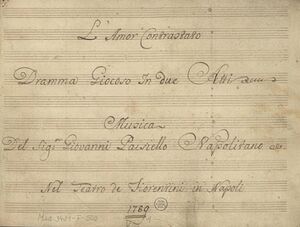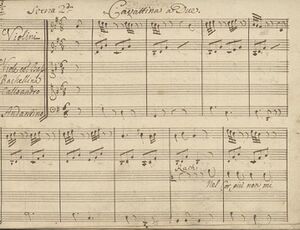Nel cor più non mi sento
| La Molinara ossia l'amor contrastato | |
|---|---|
| Dramma giocoso per musica in due atti by Giovanni Paisiello | |
 First page of the sheet music, Naples, 1789[1] | |
| Full title | La Molinara ossia l'amor contrastato |
| English | The Fair Maid of the Mill or the Thwarted Love |
| Libretto | Giuseppe Palomba |
| Dedication | A sua altezza reale Maria Amalia, Infanta di Spagna, Arciduchessa d'Austria, Duchessa di Parma, Piacenza, Guastalla ec. ec. ec.[2] |
| Premiere | |
| Date | 1788 |
"Nel cor più non mi sento" is easily be called the most famous of Giovanni Paisiellos and Giuseppe Palombas creations.[3] It inspired Ludwig van Beethoven to his Six variations in G for piano, (WoO 70) in 1795. In 1821, Paganini picked up the "Nel cor" for his Introduction and variations in G major for violin, (Op. 38, MS 44), which is known to us thanks to concertmaster Carl Guhr who wrote down what he remembered from Paganini's concerts in Frankfurt by ear.[4]
Its inclusion in the 24 Italian Songs and Arias by Schirmer (Ed.) and Alessandro Parisotti's Arie Antiche (1885) made it well known by vocal coaches and aspiring singers.
Nel cor più non mi sento originally appears in Act II of the opera La molinara (engl: The Beautiful Miller), also called L'amor contrastato (The Thwarted Love).
The aria is sung by the eponymous beautiful miller, the mischievous Rachelina, who enjoys the attention of two men – the nobleman Calloandro and the notary Pistofolo.[5] While in aria collections, the piece is limited to Rachelina's part, in the opera, the song is picked up by the two men so attracted to her.
"Nel cor più non mi sento" appears on the following album:
| Year | Album | With |
|---|---|---|
| 2021 | À sa guitare (Album) | Thibaut Garcia |
Libretto
from L'amor contrastato
Giovanni Paisiello (music), Giuseppe Palomba (words)
Rachelina | |
Rachelina | |
Ancient German | |
Rachelina Text from the version for the "Churfürstlich-Sächsische | |
Rachelina Text from the Version for Paris, 1811[10] | |
Manuscripts and sheet music

- Free Score at the IMSLP
- Sächsische Landesbibliothek in Desdren
- Handschrift nr. Mus. 3481/F/503
- Nel Teatro di Fiorentini in Napoli
- 1789
- "L'Amor Contrastato: Dramma Giocoso In Due Atti : Music Del Sigr. Giovanni Paisiello Napolitane; Nel Teatro de Fiorentini in Napoli 1789". Library of Congress. Retrieved October 8, 2021.
- Free Libretto #1
- In this libretto, "Nel cor più non mi sento" is missing.
- PAISIELLO, GIOVANNI: LA MOLINARA OSSIA L'AMOR CONTRASTATO
- Paisiello, Giovanni -- (GND: 119010097)
- La molinara ossia l'amor contrastato
- Dramma giocoso per musical
- Entstehung: Parma: Carmignani, 1791
- Umfang: 4 Bl., 62 S., 1 Bl.
- Standort: München, Bayerische Staatsbibliothek -- L.eleg.m. 4036
- Identifikator: BSB-ID 1093793
- Identifikator: BV001663179
- Identifikator des digitalen Objekts
- urn:nbn:de:bvb:12-bsb10578856-7
- Paisiello, Giovanni (1791). "La molinara ossia l'amor contrastato". MDZ Digitale Sammlungen. Retrieved October 8, 2021.
*Free Libretto #2
- Library of Congress
- ML48 / S7592
- La Scala, Milan, 1810
- Includes a synopsis and cast for a ballet intermission, "Jolanda"
- Paisiello, Giovanni. "La molinara, ossia, L'amor contrastato : dramma giocoso per musica in due atti : da rappresentarsi nel R.o teatro alla Scala la primavera dell'anno 1810". Library of Congress. Retrieved October 8, 2021.
- Free French libretto from 1811
- La Molinara,
- Dramma Giocoso in due atti
- La Meunière,
- Opéra bouffon en deux actes
- Représenté pour la 1.re fois sure le Théâtre de l'Impératrice, 1.er Juillet 1809. Quatrième Édition.
- Paisiello, Giovanni (1811). "La molinara, ossia, L'amor contrastato : dramma giocoso per musica in due atti : da rappresentarsi nel R.o teatro alla Scala la primavera dell'anno 1810". Google Books. Adrien Garnier, Libraire du Théâtre de l'Imperatrice, rue de la Harpe, N. 35, et À l'Odéon. Retrieved October 8, 2021.
- Free German libretto from 1790
- Die streitig gemachte Liebschaft : ein musikalisches Lustspiel für das Churfürstlich-Sächsisches Theater.
- [s.n.], Dresden, 1790, monographic.
- Paisiello, Giovanni (1811). "Die streitig gemachte Liebschaft". Library of Congress. Retrieved October 8, 2021.
- Free English libretto
- La Molinara;
- A Comic Opera,
- in Two Acts:
- As represented at
- The King's Theatre
- in
- The Haymarket,
- For the First Time
- On Saturday, March 8, 1817
- The Music By Paisiello
- London
- Printed by W. Winchester and Son, in The Strand
- at: Bayerische Staatsbibliothek
- Paisiello, Giovanni (1817). "La Molinara; A Comic Opera in Two Acts". Google Books. W. Winchester and Son. Retrieved October 8, 2021.
References
- ↑ 1.0 1.1 "L'Amor Contrastato: Dramma Giocoso In Due Atti : Music Del Sigr. Giovanni Paisiello Napolitane; Nel Teatro de Fiorentini in Napoli 1789". IMSLP. Sächsische Landesbibliothek. Retrieved October 8, 2021.
- ↑ Paisiello, Giovanni (1791). "La molinara ossia l'amor contrastato". MDZ Digitale Sammlungen. Retrieved October 1, 2021.
- ↑ "Nel cor più non mi sento". Wikipedia. Archived from the original on October 8, 2021. Retrieved October 8, 2021.
- ↑ "Niccolò Paganini, Introduktion und Variationen über "Nel cor più non mi sento"". Villa Musica. Archived from the original on October 8, 2021. Retrieved October 8, 2021.
- ↑ "La Molinara, Paisiello". Opera Manager. Archived from the original on October 8, 2021. Retrieved October 8, 2021.
- ↑ Paisiello, Giovanni. "La molinara, ossia, L'amor contrastato : dramma giocoso per musica in due atti : da rappresentarsi nel R.o teatro alla Scala la primavera dell'anno 1810". Library of Congress. Retrieved October 8, 2021.
- ↑ Paisiello, Giovanni (1817). "La Molinara; A Comic Opera in Two Acts". Google Books. W. Winchester and Son. Retrieved October 8, 2021.
- ↑ English translation by FR, 2021
- ↑ Paisiello, Giovanni (1811). "Die streitig gemachte Liebschaft". Library of Congress. Retrieved October 8, 2021.
- ↑ Paisiello, Giovanni (1811). "La molinara, ossia, L'amor contrastato : dramma giocoso per musica in due atti : da rappresentarsi nel R.o teatro alla Scala la primavera dell'anno 1810". Google Books. Adrien Garnier, Libraire du Théâtre de l'Imperatrice, rue de la Harpe, N. 35, et À l'Odéon. Retrieved October 8, 2021.